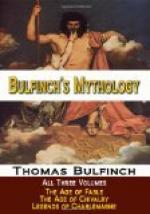Astolpho, protected by these gifts, thanked the good fairy, took leave of her, and set out on his return to France. His voyage was prosperous, and on reaching the desired port he took leave of the faithful mariners, and continued his journey by land. As he proceeded over mountains and through valleys he often met with bands of robbers, wild beasts, and venomous serpents, but he had only to sound his horn to put them all to flight.
Having landed in France, and traversed many provinces on his way to the army, he one day, in crossing a forest, arrived beside a fountain, and alighted to drink. While he stooped at the fountain a young rustic sprang from the copse, mounted Rabican, and rode away. It was a new trick of the enchanter Atlantes. Astolpho, hearing the noise, turned his head just in time to see his loss; and, starting up, pursued the thief, who, on his part, did not press the horse to his full speed, but just kept in sight of his pursuer till they both issued from the forest; and then Rabican and his rider took shelter in a castle which stood near. Astolpho followed, and penetrated without difficulty within the court-yard of the castle, where he looked around for the rider and his horse, but could see no trace of either, nor any person of whom he could make inquiry. Suspecting that enchantment was employed to embarrass him, he bethought him of his book, and on consulting it discovered that his suspicions were well founded. He also learned what course to pursue. He was directed to raise the stone which served as a threshold, under which a spirit lay pent, who would willingly escape, and leave the castle free of access. Astolpho applied his strength to lift aside the stone. Thereupon the magician put his arts in force. The castle was full of prisoners, and the magician caused that to all of them Astolpho should appear in some false guise—to some a wild beast, to others a giant, to others a bird of prey. Thus all assailed him, and would quickly have made an end of him, if he had not bethought him of his horn. No sooner had he blown a blast than, at the horrid larum, fled the cavaliers and the necromancer with them, like a flock of pigeons at the sound of the fowler’s gun. Astolpho then renewed his efforts on the stone, and turned it over. The under face was all inscribed with magical characters, which the knight defaced, as directed by his book; and no sooner had he done so, than the castle, with its walls and turrets, vanished into smoke.
The knights and ladies set at liberty were, besides Rogero and Bradamante, Orlando, Gradasso, Florismart, and many more. At the sound of the horn they fled, one and all, men and steeds, except Rabican, which Astolpho secured, in spite of his terror. As soon as the sound had ceased Rogero recognized Bradamante, whom he had daily met during their imprisonment, but had been prevented from knowing by the enchanter’s arts. No words can tell the delight with which they recognized each other, and recounted mutually




